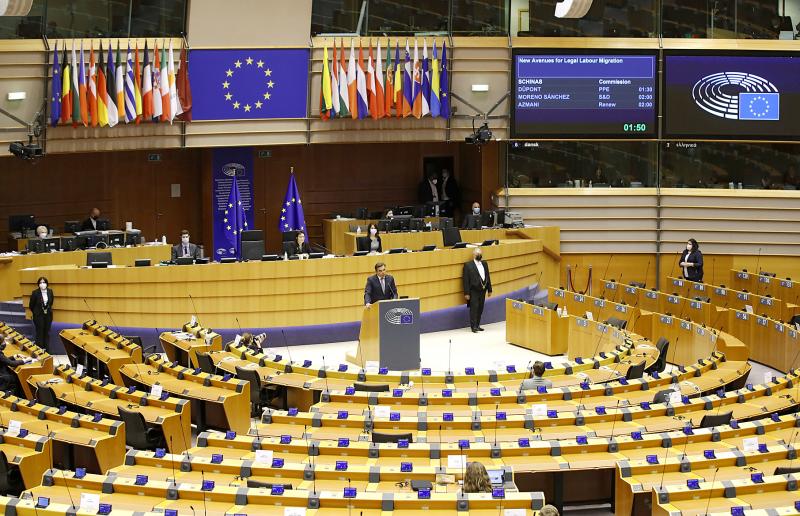China yesterday rejected demands by the European Parliament that it lift sanctions against EU legislators to save a trade deal between the two sides.
Chinese Ministry of Foreign Affairs spokesperson Zhao Lijian (趙立堅) said that the sanctions were justified and demanded that the European side “immediately stop interfering in China’s internal affairs [and] abandon its confrontational approach.”
“The unreasonable sanctions imposed by the EU have led to difficulties in China-EU relations. That is what China does not want to see, and the responsibility does not lie with the Chinese side,” Zhao said at a daily briefing.

Photo: EPA-EFE
The European Parliament on Thursday warned China that it would not ratify a long-awaited business investment deal as long as sanctions against its legislators remain in place.
Beijing imposed sanctions after the EU, the UK, Canada and the US launched coordinated sanctions against Chinese officials over alleged human rights abuses in Xinjiang.
Among those targeted were EU lawmakers Reinhard Butikofer, Michael Gahler, Raphael Glucksmann, Ilhan Kyuchyuk and Miriam Lexmann.
The investment accord was agreed to in principle in December last year, but needs lawmakers’ approval to take effect.
In addition to the lifting of sanctions, legislators said that they would take into account the human rights situation in China when deciding whether to approve the deal.
The EU hopes that the agreement would create new investment opportunities for European companies in China by ensuring that they can compete on an equal footing to their domestic rivals, and help correct a trade imbalance.
China is the bloc’s second-
biggest trading partner behind the US, and the bloc is China’s largest trading partner, EU data showed.
On average, China and Europe trade more than 1 billion euros (US$1.22 billion) per day.
Zhao reiterated China’s stance that the agreement is a “balanced and win-win deal that benefits both sides, rather than a gift or favor bestowed by one side to the other.”
“China has always been sincere in promoting cooperation between the two sides, and we hope that the European side will move in the same direction as us, with less emotional outburst and more rational thinking, and make the right decision in their own interests,” Zhao said.

A Chinese aircraft carrier group entered Japan’s economic waters over the weekend, before exiting to conduct drills involving fighter jets, the Japanese Ministry of Defense said yesterday. The Liaoning aircraft carrier, two missile destroyers and one fast combat supply ship sailed about 300km southwest of Japan’s easternmost island of Minamitori on Saturday, a ministry statement said. It was the first time a Chinese aircraft carrier had entered that part of Japan’s exclusive economic zone (EEZ), a ministry spokesman said. “We think the Chinese military is trying to improve its operational capability and ability to conduct operations in distant areas,” the spokesman said. China’s growing

Nine retired generals from Taiwan, Japan and the US have been invited to participate in a tabletop exercise hosted by the Taipei School of Economics and Political Science Foundation tomorrow and Wednesday that simulates a potential Chinese invasion of Taiwan in 2030, the foundation said yesterday. The five retired Taiwanese generals would include retired admiral Lee Hsi-min (李喜明), joined by retired US Navy admiral Michael Mullen and former chief of staff of the Japan Self-Defense Forces general Shigeru Iwasaki, it said. The simulation aims to offer strategic insights into regional security and peace in the Taiwan Strait, it added. Foundation chair Huang Huang-hsiung

PUBLIC WARNING: The two students had been tricked into going to Hong Kong for a ‘high-paying’ job, which sent them to a scam center in Cambodia Police warned the public not to trust job advertisements touting high pay abroad following the return of two college students over the weekend who had been trafficked and forced to work at a cyberscam center in Cambodia. The two victims, surnamed Lee (李), 18, and Lin (林), 19, were interviewed by police after landing in Taiwan on Saturday. Taichung’s Chingshui Police Precinct said in a statement yesterday that the two students are good friends, and Lin had suspended her studies after seeing the ad promising good pay to work in Hong Kong. Lee’s grandfather on Thursday reported to police that Lee had sent

BUILDUP: US General Dan Caine said Chinese military maneuvers are not routine exercises, but instead are ‘rehearsals for a forced unification’ with Taiwan China poses an increasingly aggressive threat to the US and deterring Beijing is the Pentagon’s top regional priority amid its rapid military buildup and invasion drills near Taiwan, US Secretary of Defense Pete Hegseth said on Tuesday. “Our pacing threat is communist China,” Hegseth told the US House of Representatives Appropriations Subcommittee on Defense during an oversight hearing with US General Dan Caine, chairman of the Joint Chiefs of Staff. “Beijing is preparing for war in the Indo-Pacific as part of its broader strategy to dominate that region and then the world,” Hegseth said, adding that if it succeeds, it could derail